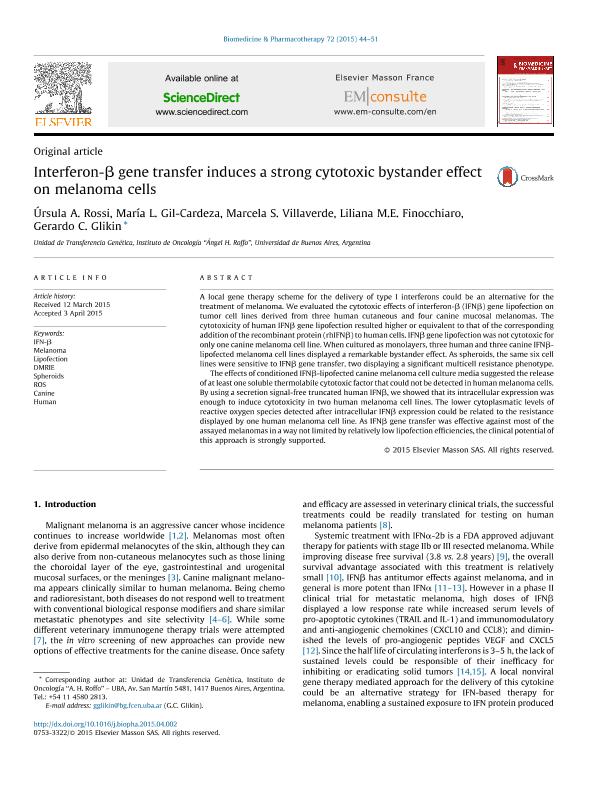Mostrar el registro sencillo del ítem
dc.contributor.author
Rossi, Ursula Amaranta

dc.contributor.author
Gil Cardeza, Maria Lourdes

dc.contributor.author
Villaverde, Marcela Solange

dc.contributor.author
Finocchiaro, Liliana Maria Elena

dc.contributor.author
Glikin, Gerardo Claudio

dc.date.available
2018-03-14T18:04:50Z
dc.date.issued
2015-05
dc.identifier.citation
Rossi, Ursula Amaranta; Gil Cardeza, Maria Lourdes; Villaverde, Marcela Solange; Finocchiaro, Liliana Maria Elena; Glikin, Gerardo Claudio; Interferon-β gene transfer induces a strong cytotoxic bystander effect on melanoma cells; Elsevier France-editions Scientifiques Medicales Elsevier; Biomedicine & Pharmacotherapy = Biomedecine & Pharmacotherapie; 72; 5-2015; 44-51
dc.identifier.issn
0753-3322
dc.identifier.uri
http://hdl.handle.net/11336/38750
dc.description.abstract
A local gene therapy scheme for the delivery of type I interferons could be an alternative for the treatment of melanoma. We evaluated the cytotoxic effects of interferon-β (IFNβ) gene lipofection on tumor cell lines derived from three human cutaneous and four canine mucosal melanomas. The cytotoxicity of human IFNβ gene lipofection resulted higher or equivalent to that of the corresponding addition of the recombinant protein (rhIFNβ) to human cells. IFNβ gene lipofection was not cytotoxic for only one canine melanoma cell line. When cultured as monolayers, three human and three canine IFNβ-lipofected melanoma cell lines displayed a remarkable bystander effect. As spheroids, the same six cell lines were sensitive to IFNβ gene transfer, two displaying a significant multicell resistance phenotype.The effects of conditioned IFNβ-lipofected canine melanoma cell culture media suggested the release of at least one soluble thermolabile cytotoxic factor that could not be detected in human melanoma cells. By using a secretion signal-free truncated human IFNβ, we showed that its intracellular expression was enough to induce cytotoxicity in two human melanoma cell lines. The lower cytoplasmatic levels of reactive oxygen species detected after intracellular IFNβ expression could be related to the resistance displayed by one human melanoma cell line. As IFNβ gene transfer was effective against most of the assayed melanomas in a way not limited by relatively low lipofection efficiencies, the clinical potential of this approach is strongly supported.
dc.format
application/pdf
dc.language.iso
eng
dc.publisher
Elsevier France-editions Scientifiques Medicales Elsevier

dc.rights
info:eu-repo/semantics/openAccess
dc.rights.uri
https://creativecommons.org/licenses/by-nc-nd/2.5/ar/
dc.subject
Canine
dc.subject
Dmrie
dc.subject
Human
dc.subject
Ifn-Β
dc.subject
Lipofection
dc.subject
Melanoma
dc.subject
Ros
dc.subject
Spheroids
dc.subject.classification
Otras Ciencias Biológicas

dc.subject.classification
Ciencias Biológicas

dc.subject.classification
CIENCIAS NATURALES Y EXACTAS

dc.title
Interferon-β gene transfer induces a strong cytotoxic bystander effect on melanoma cells
dc.type
info:eu-repo/semantics/article
dc.type
info:ar-repo/semantics/artículo
dc.type
info:eu-repo/semantics/publishedVersion
dc.date.updated
2018-03-13T13:57:29Z
dc.journal.volume
72
dc.journal.pagination
44-51
dc.journal.pais
Francia

dc.journal.ciudad
Paris
dc.description.fil
Fil: Rossi, Ursula Amaranta. Universidad de Buenos Aires. Facultad de Medicina. Instituto de Oncología ; Argentina. Consejo Nacional de Investigaciones Científicas y Técnicas; Argentina
dc.description.fil
Fil: Gil Cardeza, Maria Lourdes. Universidad de Buenos Aires. Facultad de Medicina. Instituto de Oncología ; Argentina. Consejo Nacional de Investigaciones Científicas y Técnicas; Argentina
dc.description.fil
Fil: Villaverde, Marcela Solange. Universidad de Buenos Aires. Facultad de Medicina. Instituto de Oncología ; Argentina. Consejo Nacional de Investigaciones Científicas y Técnicas; Argentina
dc.description.fil
Fil: Finocchiaro, Liliana Maria Elena. Universidad de Buenos Aires. Facultad de Medicina. Instituto de Oncología ; Argentina. Consejo Nacional de Investigaciones Científicas y Técnicas; Argentina
dc.description.fil
Fil: Glikin, Gerardo Claudio. Universidad de Buenos Aires. Facultad de Medicina. Instituto de Oncología ; Argentina. Consejo Nacional de Investigaciones Científicas y Técnicas; Argentina
dc.journal.title
Biomedicine & Pharmacotherapy = Biomedecine & Pharmacotherapie

dc.relation.alternativeid
info:eu-repo/semantics/altIdentifier/url/https://www.sciencedirect.com/science/article/pii/S0753332215000931
dc.relation.alternativeid
info:eu-repo/semantics/altIdentifier/doi/http://dx.doi.org/10.1016/j.biopha.2015.04.002
Archivos asociados
